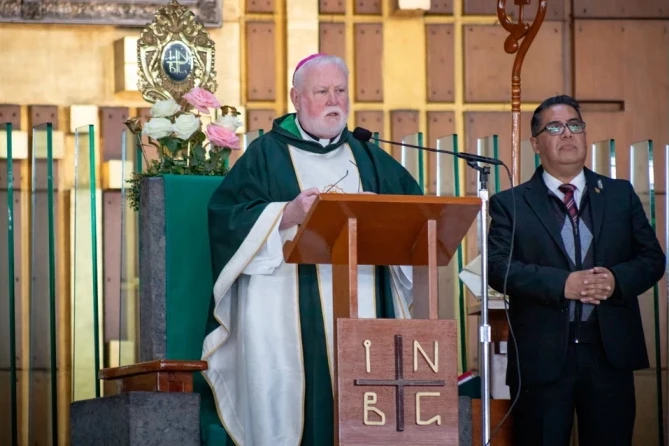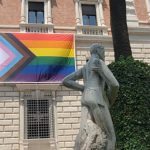
Vatican City, Jul 30, 2025 / 17:09 pm (CNA).
Archbishop Paul Richard Gallagher, secretary for relations with states and international organizations of the Holy See, noted that universities are not Catholic “because of the number of crucifixes” but because they strive to seek truth that is “in harmony with the certainty of faith.”
“Far from being just another institution in the global marketplace of ideas, and much less Catholic just because of the number of crucifixes on its walls or chapel services, a truly Catholic university is a place where the search for truth is in harmony with the certainty of faith,” he noted.
As reported by Vatican News, Gallagher gave his reflections during the inaugural conference of the 28th general assembly of the International Federation of Catholic Universities (IFCU), held July 28 in Guadalajara, Mexico.
During his visit to Mexico, the prelate emphasized that Catholic universities are called to play a “central role” in building peace through knowledge, dialogue, and the formation of ethical leaders.
In his address, the archbishop strongly argued that, in a context marked by armed conflict, ideological divisions, and growing polarization, Catholic universities must reaffirm their original vocation: to be beacons of humanity and understanding.
“Catholic universities — and also papal representatives — have always been beacons of knowledge, faith, and service to humanity,” he said.
The prelate thus emphasized their potential as active agents in the international arena: “In these turbulent times marked by conflict and war, division and mistrust, [universities] are called to reaffirm their vocation as builders of peace, collaborators in building bridges of understanding between cultures, religions, and disciplines.”
Academic diplomacy: A bridge between cultures and knowledge
From this perspective, Gallagher defended the concept of “academic diplomacy,” which he defined as an essential instrument for dialogue between peoples and fields of knowledge. “They can uniquely develop academic diplomacy as a means to promote peace through thoughtful engagement, ethical reflection, and respectful dialogue,” he explained, insisting that the university vocation goes far beyond the transmission of technical knowledge.
Gallagher also proposed rediscovering the universal value of a deep-rooted Catholic identity, capable of dialogue with everyone without losing its center.
“A truly Catholic education is not isolated but extroverted and committed to the universal search for truth,” he affirmed. “In a world awash in relativism and polarization, this deeply rooted — and therefore universal — Catholic identity constitutes a powerful resource.”
In this regard, he recalled that the Christian conception of the human being is a solid foundation for peace: “The anthropological conception that sees every person, regardless of race, religion, nationality, or condition, in the image and likeness of God, endowed with reason and conscience, and destined for communion, is a solid foundation upon which to build peace through dialogue.”
The archbishop also recalled his experience as a student at the Pontifical Gregorian University to illustrate how the university environment can foster authentic bonds. Along these lines, he affirmed that universities are “seeds of peace that are sown in classrooms, laboratories, residences, and libraries.”
He therefore said that the entire university can be an authentic diplomatic mission: “not an ivory tower disconnected from reality, but an active participant in building a culture of peace.”
This mission, he clarified, requires an interdisciplinary and collaborative structure: “This is intrinsically interdisciplinary, because only mutual exchange enriches all parties and contributes to the development of leaders capable of guiding their societies with wisdom and compassion.”
Regarding the content that should occupy a prominent place in this academic diplomacy, the Vatican official emphasized that many of the challenges of war and peace “in today’s world can only be addressed in a sustained manner by returning to these principles and applying them.”
“If they are ignored, already difficult situations can deteriorate rapidly and with terrible consequences,” he explained.
He also emphasized that diplomacy requires specialists but also “needs generalists who seek a broad and nuanced vision.”
Finally, the archbishop reaffirmed the Holy See’s commitment to a diplomacy that does not surrender to pragmatism but remains anchored in principles and humanity.
“In our efforts, we promote peace, defend human dignity, and give a voice to those without one, especially the poor, the displaced, and the marginalized,” he concluded.
This story was first published by ACI Prensa, CNA’s Spanish-language news partner. It has been translated and adapted by CNA.
If you value the news and views Catholic World Report provides, please consider donating to support our efforts. Your contribution will help us continue to make CWR available to all readers worldwide for free, without a subscription. Thank you for your generosity!
Click here for more information on donating to CWR. Click here to sign up for our newsletter.











